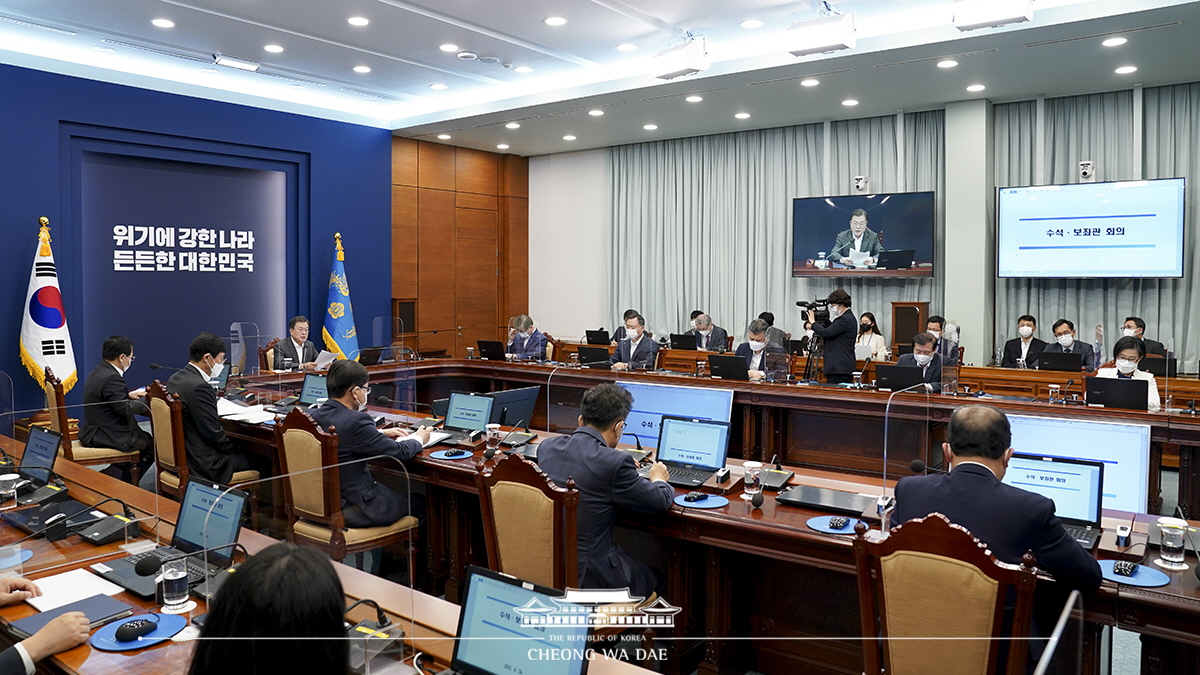이 웹사이트는 제19대 대통령 임기 종료에 따라 대통령기록관이 「대통령기록물 관리에 관한 법률」에 의해 이관받아 서비스하는 대통령기록물입니다. 자료의 열람만 가능하며 수정 · 추가 · 삭제는 불가능합니다.
다만, 「개인정보보호법」에 의하여 개인의 정보를 보호받기 원하시는 분은 관련 내용(요청자, 요청내용, 연락처, 글위치)을 대통령 웹기록물 담당자(044-211-2253)에게 요청해 주시면 신속히 검토하여 조치해 드리겠습니다. 감사합니다.
SPEECHES & REMARKS
BRIEFINGS
Opening Remarks by President Moon Jae-in at Meeting with His Senior Secretaries

Today, we have three outside experts from the Presidential Commission on Policy Planning joining us to discuss items on the agenda – Commission Chairman Cho Dae-yeop, the head of its Support Group for Administrative Tasks Yun Tae-beom and the head of its Research Group for Future Policies Park Tae-gyun. Please welcome them with a round of applause.
Even if one country manages to bring an epidemic under control in its own territory, a global pandemic with an infectious disease like COVID-19 cannot be ended. That’s why this kind of problem requires international solidarity and cooperation more than any other issue. Nonetheless, this is not the case when it comes to the reality of international politics. All countries spoke in one voice about solidarity and cooperation when they were not feeling pressured. When their domestic situations turned urgent, however, they began to seek ways to survive on their own by sealing off borders, restricting vaccine exports and stockpiling doses as both solidarity and international cooperation took a backseat. We have to face up to the grim reality of international politics while pursuing international solidarity and cooperation. It is in times like these when we should unite internally and address challenges wisely.
Even given this situation, we have secured the necessary supplies of an assortment of vaccines properly arranged to match the vaccination priorities, the timeline for herd immunity and the inoculation plans, which have all been set by our professionals. Vaccines are being delivered on time as stipulated in contracts, and vaccinations are proceeding as planned without disruption. What is most important is to make plans based on our situation and carry them out as scheduled without comparing ourselves to countries with different circumstances.
From the beginning, the Government clearly presented the goal of achieving herd immunity by November and accordingly announced the overall vaccination plan, including inoculation orders. We also made more detailed objectives public for inoculating 3 million people by the end of April and 12 million during the first half of the year. The Government is confident that these vaccination goals can be met, and internally, we aim to increase the numbers inoculated by those dates and achieve herd immunity earlier.
If we wait only a little longer, we can see whether the Government has inoculated 3 million people by the end of April and 12 million or more during the first half of the year as planned. If things do not proceed as planned, there will be ample opportunities to question Government actions. Therefore, at this stage, I ask everyone to refrain from excessively politicizing the issue so as not to stoke a baseless uneasiness about the vaccine supplies and inoculation.
To prepare for the possible disruption of our vaccine supply and further accelerate inoculations and to brace for the need to expand the age groups to be vaccinated and provide booster shots, the Government has formed a pan-government task force and is mobilizing all of its administrative and diplomatic capabilities to secure additional supplies. Consequently, we have been able to sign a purchase agreement for 40 million more doses of Pfizer’s vaccine. The Government will make preparations for whatever is needed going forward. With regard to other vaccines, outside those that have already been secured, we are scrutinizing international trends as well as their effectiveness and safety.
Despite the global shortage of vaccine production capacity, the countries that developed vaccines prioritizing their own needs and the major countries hoarding supplies, Korea has been able to secure the required amount of vaccines. The powerful driving forces were Korea’s proven standing as an exemplary nation for epidemic prevention and control, Korean companies’ contract manufacturing capabilities for vaccines that are the best in the world and their ability to produce LDS syringes. Currently, Korean companies are contract manufacturing three types of vaccines, and that number is expected to increase going forward. This will be of great help for securing vaccines until we develop our own. I ask the people to have confidence as well.
Although vaccinations are accelerating around the world, the number of confirmed cases has actually continued to increase, recording a new daily high. With only a few exceptions, even countries at the forefront of the inoculation are also facing a crisis from another COVID-19 wave. This shows that people should not let their guard down in terms of epidemic prevention and control just because they are vaccinated and that we must do all we can to stop the virus from spreading until herd immunity is achieved.
Although Korea has a relatively small number of confirmed cases, we cannot feel at ease with COVID-19 continuing to spread. There is one silver lining: Since most of those in high-risk groups have been vaccinated and domestically developed treatments are being used, the proportion of patients who are critically or severely ill and our case fatality rate have decreased significantly. Currently, Korea’s COVID-19 fatality rate is the lowest among major countries.
However, if the number of confirmed cases increases further and COVID-19 variants continue to spread, the situation can suddenly worsen. Now, the epidemic prevention authorities are shouldering the twin burdens of having to accelerate vaccinations and strengthen epidemic control management. The only solution is active cooperation and participation by the people. Although the Government will do everything possible, I urge the people to continue to comply with epidemic prevention and control guidelines and participate in the inoculation drive.



